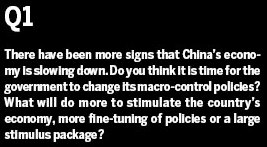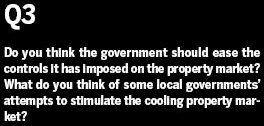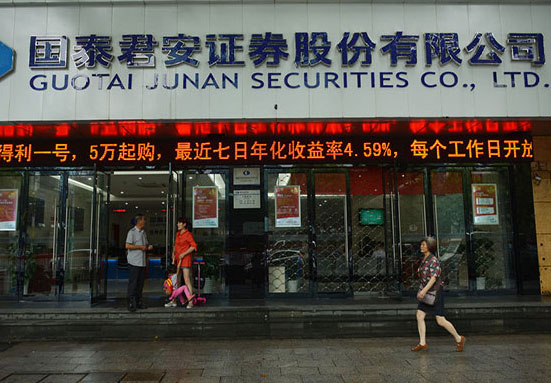

|
 |
Liu Yuanchun
Deputy dean of the School of Economics at Renmin University of China
 |
At present, China's economy is approaching the bottom. I think it will probably hit bottom in May.
The slowdown has taken longer to come about than we thought, since difficulties that the government did not overcome in past years are becoming more serious. Certainly we need to further loosen policies to shore up the economy, but a little fine-tuning would be more acceptable, especially with uncertainties existing in the monetary policies of Europe and the United States. We are better off to stay prudent in the current circumstances and firmly reject any offer of a new stimulus package.
While the economy is slowing down, there are also obvious signs of a rebound. If we adopt a large-scale loosening at this time, the market's natural pace of recovery will be interrupted. Instead of redirecting its policies, the government should pay more attention to proceeding with reforms for the medium- and long-term while keeping the economy stable in the short term.
If we don't believe in the market's ability to repair itself and simply trust the power of government intervention, we'll probably only find ourselves trapped in short-term turbulence.
 |
Although China's consumer price index continues to moderate, inflationary pressures still exist.
As we know, the country has already entered a period of price hikes propelled by rising costs. In addition, commodity prices will be highly affected by large economies' oil reserves and the international situation. All the conditions point to the same conclusion: in the medium-term, inflationary pressure (at a likely rate of 4 percent) will be quite normal for the economy.
Macroeconomic policies, especially monetary policies, will have the important goal of keeping inflation under control. The only difference now is that the economic slowdown is becoming a top concern.
 |
The ongoing fine-tuning is also leading to appropriate loosening of lending related to the property sector, while keeping purchase limits untouched. China could encourage lending to buyers of first homes, or even second homes, while watching closely how some large real estate developers obtain capital in order to prevent a failure among them from harming the economy.
In the short term, it will be necessary for the government to take quick measures to deflate investment bubbles. But, in the long run, it should try to support a reasonable amount of demand for property, and the best way to ease real estate prices is by increasing supply.
 |
The government is promoting sales of home electronic appliances and construction materials in rural areas, which will boost domestic consumption to some extent. I expect there to be more deregulation for some industries to allow private investment to play a bigger role. Some important projects under construction, affordable homes and railways, should receive more credit.
As fiscal revenue is increasing at a much slower pace, the government is less likely to try to spur the economy by cutting taxes. Instead, it has more space to increase fiscal expenditure in some areas. I think a deficit ratio of 2 percent would be proper, judging from the current situation. That means an officially set deficit of 800 billion yuan ($126.2 billion) is not enough and it should be increased to about 1.1 trillion yuan.
 Business giants celebrate the success of entrepreneurship
Business giants celebrate the success of entrepreneurship
 Top 10 Chinese businesswomen in 2015
Top 10 Chinese businesswomen in 2015
 Female robot sings in Shanghai
Female robot sings in Shanghai
 21st Lanzhou Investment and Trade Fair kicks off in Lanzhou
21st Lanzhou Investment and Trade Fair kicks off in Lanzhou
 Top 10 Chinese brokerage firms in H1 of 2015
Top 10 Chinese brokerage firms in H1 of 2015
 Fancy sculptures sparkle in Chongqing
Fancy sculptures sparkle in Chongqing
 Top 10 most competitive Chinese cities in Belt and Road Initiative
Top 10 most competitive Chinese cities in Belt and Road Initiative
 Italian designer tailors success in China
Italian designer tailors success in China